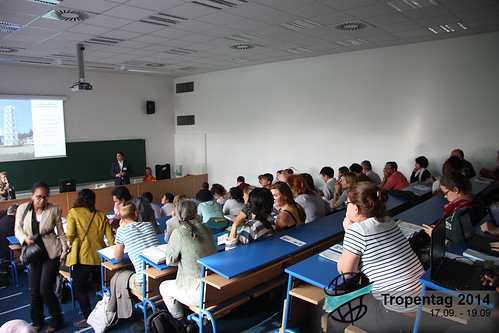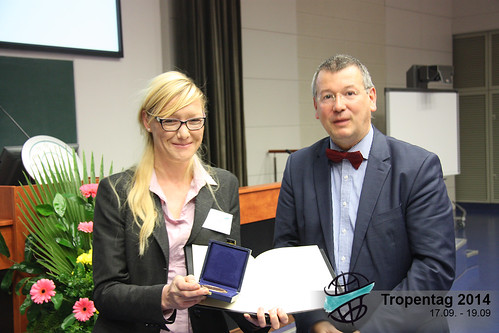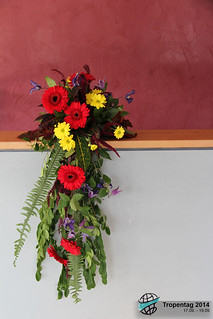Blogs
“Saving food saves resources”— Tanja Pickardt
Mon, 09/22/2014 - 21:01 — Pramila Thapa
‘In general, one-third of the food produced is lost’ said Tanja Pickardt during a presentation at Tropentag. According to FAO, loss varies with type of the food produced. For example, the loss in grain is less as compared to fruits, vegetables, and dairy products. Pickardt said that it is necessary to quantify the food loss before making policy decisions, but it is very difficult to quantify the actual quantity of food wasted. To illustrate this point, she showed a video by FAO titled "Food Wastage Footprint 2". The environmental and social consequences are more difficult to quantify than economic losses. Also in this video, we can see different ways to reduce food loss and alternative uses of wasted food.
 (Continue...)
(Continue...)
 (Continue...)
(Continue...)
“Camel to human”— Anne Liljander on Nutritional Security or death?
Mon, 09/22/2014 - 14:10 — Pramila Thapa
Animal with robust health that can survive in harsh environmental conditions, camel is a good opportunity for nutritional security in South Saharan Africa, SSA. The milk and meat from camel is really good for the human health said Anne Liljander in her presentation tin Tropentag 2014, Prague. But who knows if the same camel carries the deadly virus?
With the outbreak of a deadly disease in Saudi Arabia in 2012, Middle East Respiratory Syndrome (MERS) caught an attention of researchers. Out of 250 human infections, 93 cases were reported fatal. Most of the people with this viral infection confirmed with this virus had serious respiratory illness. Anne and her team conducted research to find out the source of the virus. Finally, the viral strain was found in humped dromedary came that were imported from African Peninsula.
Getting back to the SSA, in Kenya, they found that 29% of camels were MERS positive. In the sample from 1992 (Kenya) and from 1983 (Somalia and Sudan), the camels had antibodies to MERS-Cov. It is always interesting to know if zoonotic diseases are fatal. Who knows if another “Evola-like” disease is too near to be pandemic? All the best for success on sustainable solution for the research team!
Were there unmet expectations?
Fri, 09/19/2014 - 19:53 — Ruffy Rodrigo
While sitting at parallel sessions on natural resource management, I find it really interesting to watch people come and go. I have observed people leave after one presentation and another group of people come in. I can’t help but wonder why? Were there any expectation that the presentations didn’t meet? Were the presenters boring?
 (Continue...)
(Continue...)
 (Continue...)
(Continue...)
Spreading the Enthusiasm for Excellence in Research
Fri, 09/19/2014 - 19:05 — Helen Sitar
“‘The intrinsic motivation of the researcher’ – that is what unites us,” asserted Dr. Christoph Sänger, quoting Goethe, at the Hans H. Ruthenberg-Graduate and the Josef G. Knoll European Science Award Ceremony on Friday. Sänger, who investigated small farmer dairy markets in Vietnam, was one of six young researchers who were lauded for the excellence, relevance, and social and scientific contribution of their Masters or Ph.D. theses.
 Eva-Marie Meemken Receives a Hans H. Ruthenberg-Graduate-Award 2014 at Tropentag
(Continue...)
Eva-Marie Meemken Receives a Hans H. Ruthenberg-Graduate-Award 2014 at Tropentag
(Continue...)
 Eva-Marie Meemken Receives a Hans H. Ruthenberg-Graduate-Award 2014 at Tropentag
Eva-Marie Meemken Receives a Hans H. Ruthenberg-Graduate-Award 2014 at TropentagEarthworms and yam beans: feeding fish in the future
Fri, 09/19/2014 - 16:16 — Pin Pravalprukskul
Aquaculture is the world’s fastest growing food production industry, with farms supplying around half of the global fish supply. But to satisfy our soaring appetite for aquatic food, we first have to be able to feed the fish and shellfish. This isn’t such an easy task, as conventional feeds are becoming less sustainable and available. It’s no wonder then that the “Animal feeding and nutrition” Thematic Session was unofficially re-named “the fish and aquaculture” session, as all three presenters shined a spotlight on innovative aquaculture feed sources that are nutritious, but that can also address the challenges and demands of intensified fish and prawn farming. So what’s on the plate?
 (Continue...)
(Continue...)
 (Continue...)
(Continue...)
Michael Hauser: “we are dealing with a systemic challenge”
Fri, 09/19/2014 - 15:46 — Juan José Egas
“As soon as we have recognized that this is a systemic challenge (the gap between knowledge and action), we need systemic responses”


Interview with the manager of Tropentag 2014: Bohdan Lojka
Fri, 09/19/2014 - 12:12 — Marek
Are you interested in the background of Czech organisation team?
See how to maybe organise Tropentag at your own institution!
Introductions: Farmer, meet Innovation
Fri, 09/19/2014 - 10:36 — Rachel Friedman It’s funny that we are even discussing “farmer innovation” as somewhat of a novelty at an agricultural research conference. Agriculture took root over 10,000 years ago, as humanity shifted away from its hunter-gatherer origins. In fact, one could argue that farmers were really the first “scientists”, domesticating plants and animals through observation, trial, error, and repetition. While mention of scientists (or natural philosophers as called in antiquity) began to appear close to 3,000 years ago, the earliest research institutions (which were largely observatories) did not arise until early medieval times. So what is the commotion over new knowledge and technologies generated by the producer his/herself?
(Continue...)
It’s funny that we are even discussing “farmer innovation” as somewhat of a novelty at an agricultural research conference. Agriculture took root over 10,000 years ago, as humanity shifted away from its hunter-gatherer origins. In fact, one could argue that farmers were really the first “scientists”, domesticating plants and animals through observation, trial, error, and repetition. While mention of scientists (or natural philosophers as called in antiquity) began to appear close to 3,000 years ago, the earliest research institutions (which were largely observatories) did not arise until early medieval times. So what is the commotion over new knowledge and technologies generated by the producer his/herself?
(Continue...)




